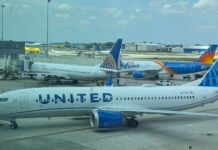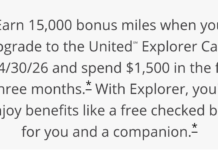Tragically, United appears to to be blocking saver award space from Star Alliance partner bookings. In this coffee break episode we’ll talk about what that means.
Watch the full coffee break episode here, or click the timestamps below to navigate directly to a specific part of the episode in YouTube.
Coffee Break: United blocking partner awards
(0:59) – Overview of United’s recent changes
Read more about these United changes here.
(01:09) – Why it matters
(07:11) – Research findings – what we’ve found out digging a little deeper…
(09:50) – Are United miles now more valuable?
(14:19) – Are United credit cards now more valuable? (extra award space)
Visit here to get updated on in-depth points and miles content like this, and don’t forget to like and follow us on social media. You’ll find all other Frequent Miler on the Air episodes here.
Music Credit – Beach Walk by Unicorn Heads





Actually I think it makes my American miles marginally more valuable and useful, relatively speaking. More often than in the past, my best deal for US domestic, and for trips that have both US and international components, will be with AA miles.
The cents/point on redemptions isn’t changing so I don’t think you can say United miles got more valuable with a straight face. They might become more useful, in that they are now the only way to book most United domestic flights with airline miles. But if the redemption value is still poor it might lead to folks just booking more cash tickets or flying with someone else instead. I agree that the AMEX Business Platinum points rebate on a chosen domestic carrier for economy flights is probably one of the best options left now.
This move by United almost completely kills what was left of value in Turkish miles, as those long domestic flights like Hawaii for 10K disappear. The whole Star Alliance must have been watching how much value Nick was getting out of Turkish and decided “not so fast there”.
Thanks for the podcast. Always enjoy this little coffee breaks.
I wouldn’t say that these changes make UA miles more valuable. I measure value in $ – and that really hasn’t changed because of these UA blocks. Each UA mile still saves me the same amount of money as before. And yet, it might make UA miles (and Bilt/UR points) more attractive/desirable relative to some other fake currencies as I do like to book awards on UA metal. But basically it just means focusing those currencies on other airline’s awards.
I never knew that you had to downgrade to the United Gateway card to see expanded economy space. great advice.
I’m sure you understood, but just in case we weren’t clear: if you have a United card with an annual fee, you’ll get the expanded economy award space as-is (no need to downgrade). But if you want to get that award space fee-free, you can downgrade to the Gateway card. Starting with the Gateway card by applying directly for it won’t give you that benefit.
Yes – I did understand. very useful comment. And fortunately this is exactly what I did earlier this year as in I downgraded to the Gateway card. thank you for your reply.
To me, the opportunity cost of transferring (my finite) Chase URs to United instead of Hyatt makes United miles too expensive. United redemptions are nominally expensive. I don’t recall any recent Chase transfer bonuses to United. If Hyatt points can be reasonably redeemed at Mr & Mrs Smith properties, I can’t imagine what else I’d use URs for. Easy for me to say as I don’t live in a United hub.
On one of my regular non-stop routes, domestic first r/t is 60k on United and only 40k on Delta. Easy choice.
United blocking awards does not make their miles more valuable since other partners may retaliate similarly. I have already seen Turkish flights available on Lifemiles, SAS, and Air Canada not showing up on United. Does that make their miles more valuable? I guess for domestic flights in which United charges an arm and a leg to fly, this is a slippery slope.